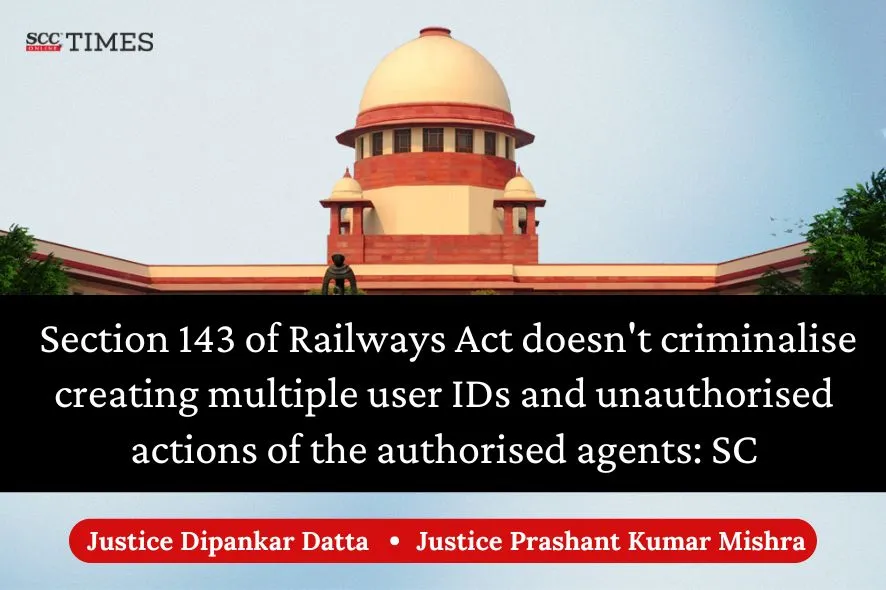Supreme Court: While considering the instant appeals revolving around the common issue of interpretation of Section 143 of the Railways Act, 1989; the Division Bench of Dipankar Datta* and Prashant Kumar Mishra, JJ., explained that, Section 143, on its plain language, prohibits any person, other than a railway servant or an authorised agent, to conduct the business of procurement and supply of railway tickets. The provision does not specify the modalities of the procurement and supply. Hence, if the Section is read and its contents are given the natural and ordinary meaning, keeping in mind the objective and purpose of the legislation, it admits of no doubt that this provision criminalises unauthorised procurement and supply, irrespective of the mode of procurement and supply.
The Court opined that merely because the system of e-reservation and e-tickets was introduced after the enactment of the 1989 Act does not render Section 143 toothless to combat the illegal sale of e-tickets. Section 143, importantly, makes no distinction between physical and online sale of tickets. The mischief that the provision seeks to remedy is that there should not be illegal and unauthorised procurement and sale of tickets, whatever be the mode — physical or online. The Court further stated that Section 143 does not criminalise creating multiple user IDs. Section 143, by being completely silent on creation of multiple user IDs, penalises the actions of only the unauthorised agents and not unauthorised actions of the authorised agents.
Background:
In the first set of appeal, the order of Kerala High Court quashed criminal proceedings against Respondent M under Section 143. Respondent M was accused of carrying out unauthorised business of procuring and supplying railway e-tickets.
In the second appeal, Respondent R challenged the decision of Madras High Court refusing to quash proceedings under Section 143. Respondent R and his sons were the owners of “Big Top Travels” which was an authorised agent for railway e-tickets. The offence alleged against him was that he has been supplying e-tickets to various customers, and that these e-tickets had been booked through multiple user IDs.
Counsels for the prosecution submitted that Section 143 of the Act does not permit authorised agents to carry out unauthorised actions under the façade of authorisation. When an authorised agent carries out unauthorised transactions using the personal IDs of other individuals, the cloak of authorisation cannot be used as a ruse. Therefore, to be exempt from the application of Section 143, both the status of the person and the nature of the action must be considered.
Per contra, submissions for the respondents stated that the plain and unambiguous words of Section 143 of the Act make it clear that the creation of multiple user IDs is not an offence under Section 143, and Section 143 must be construed strictly as it is a penal provision.
Court’s Assessment:
Perusing the impugned orders, the Court observed that Kerala High Court read down Section 143 to state that one can conduct a business of procuring and supplying tickets without the authorisation of the railways as long as it is done through the internet. The impugned order also observed that as the tickets were procured in the name of genuine passengers, it cannot be said that Respondent M had contravened Section 143.
Meanwhile, Madras High Court acknowledged that Respondent R was an authorised agent under Section 143; however, it refused to quash the criminal proceedings on the ground that such authorisation did not empower the appellant to create multiple user IDs for the purpose of procuring tickets for illegal gain.
Considering whether the act of creating fake/multiple user IDs by an individual, who may or may not be an authorized railway agent, with the intention to procure and supply online tickets through IRCTC portal would constitute an offence under Section 143 of the Act; the Court noted that the purport and objective of Section 143 of the Act is to restrict entities which are not under the disciplinary control of or are not authorised by the railways to conduct the business of procurement and supply of railway tickets. Railway servants and authorised agents stand apart since, on its own terms, Section 143 has no application to them.
The Court stated that scheme of e-ticketing was introduced for the convenience and betterment of the passenger’s experience of travelling on a train, due to which the procurement and supply of these e-tickets is highly regulated. The Court explained that IRCTC has limited the number of tickets which can be reserved on one personal user ID at 12 per month (24 per month with a user ID which is Aadhaar verified). It was alleged that Respondent M had created hundreds of fake user IDs to sell tickets without any authorisation from the railways. Although the internet and e-tickets were unknown in India when the Act was brought into force, this conduct of M (who was neither a railway servant nor an authorised agent) nevertheless attracts criminality under Section 143(1)(a) of the Act.
“Statutory interpretation has to follow certain principles which have been formulated through legal precedents. No court can refuse to enforce a provision on the sole basis of the provision predating any subsequent development regarding the ticketing process. If it can be demonstrated that a statutory provision is broad enough to envelop the subsequent developments, even if the developments were not envisioned by the legislature, the provision would stay operational”.
The Court reiterated that if the language of the particular statute under consideration is clear and unambiguous, it is not for the courts to add to or delete any words from the statute in the guise of ascertaining what could have been the legislative intent. “Having regard to the comprehensive phraseology employed in Section 143, the net of its coverage is wide enough to encompass regulation of the conduct of ticketing agents and to protect the public from unscrupulous elements trying to defraud them by sale of valueless tickets”.
The Court explained that Kerala High Court allowed the quashing petition filed by Mathew on the ground that the 1989 Act was enacted before the advent of internet and e-tickets and the lawmakers could not have envisioned sale of tickets, online. The Court found this line of reasoning of the High Court to be erroneous.
The Court further explained that travel agents, by and large, do not purchase tickets in their own name and then sell it to the passengers. Tickets are procured in the name of the passengers by these agents in lieu of a commission on the price thereof. Taking active steps, however faithfully, in order to acquire and provide tickets to third parties but without being a railway servant or an authorised agent would attract the expression ‘procure and supply’ as in Section 143.
Therefore, the Court agreed with the prosecution that Section 143, a penal provision, has been enacted to tackle a social crime.
“The Indian Railways is a keystone of our country’s infrastructure. It carries around 673 crore passengers annually and has a tremendous impact on the economy of this country. Any effort to disrupt the integrity and stability of the ticketing system has to be stopped on its tracks”.
With the afore-stated analysis, the Court stated that Penal provisions have to be read strictly and narrowly as a general rule. Thus, even if the facts disclosed in the first information report are taken at face value, commission of an offence cannot be attributed to Respondent R. Any breach has to be remedied by civil action and not criminal action.
Respondent M being an unauthorised agent must face proceedings against him; hence the Court restored the proceedings against M. Since Respondent R was an authorised agent, cannot be proceeded against under Section 143 of the 1989 Act for alleged breach of any of the terms and conditions of the contract. If, at all, he would be liable to face civil action.
CASE DETAILS
|
Citation: Appellants : Respondents : |
Advocates who appeared in this case For Petitioner(s): For Respondent(s): |
CORAM :








